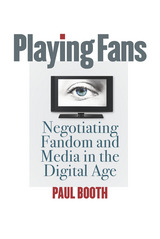3 books about Booth, Paul

Fan Phenomena
Doctor Who
Edited by Paul Booth
Intellect Books, 2013
Since its premiere in November 1963, the classic British television program Doctor Who has been a cornerstone of popular culture for half a century. From the earliest “Exterminate!” to the recent “Allons-y!,” from the white-haired grandfather to the wide-grinned youth, the show has depicted the adventures of a time-traveling, dual-hearted, quick-witted, and multi-faced hero as he battles Daleks, Cybermen, Sontarans, and all manner of nasties. And, like its main character, who can regenerate his body and change his appearance, Doctor Who fandom has developed and changed significantly in the fifty years since its inception.
In this engaging and insightful collection, fans and scholars from around the globe explore fan fiction, fan videos, and fan knitting, as well as the creation of new languages. As multifaceted as the character himself, Doctor Who fans come in many forms, and this book investigates thoroughly the multitude of fandoms, fan works, and fan discussions about this always-surprising and energetic program.
Featuring full color images of fan work and discussions of both classic and New Who fandom, this book takes reader on a journey of discovery into one of the largest worldwide fan audiences that has ever existed. Thoughtful, insightful, and readable, this is one of only a few—and certainly one of the best—guides to Doctor Who fan culture and is certain to appeal to the show’s many ardent fans across the globe.
[more]

A Fan Studies Primer
Method, Research, Ethics
Paul Booth
University of Iowa Press, 2021
The discipline of fan studies is famously undisciplined. But that doesn’t mean it isn’t structured. This is the first comprehensive primer for classroom use that shows students how to do fan studies in practical terms. With contributions from a range of established and emerging scholars, coeditors Paul Booth and Rebecca Williams pull together case studies that demonstrate the wide array of methodologies available to fan studies scholars, such as auto/ethnography, immersion, interviews, online data mining, historiography, and textual analysis. This collection also probes the ethical questions that are unique to fan studies work, such as the use of online fan content for research, interview methods, consent, and privacy.
[more]

Playing Fans
Negotiating Fandom and Media in the Digital Age
Paul Booth
University of Iowa Press, 2015
Fans are everywhere: from Fifty Shades of Grey to Veronica Mars, from Comic-Con to sitcom, from niche to Geek Chic, fans are becoming the most visible and important audience of the twenty-first century. For years the media industries ignored fans and fan activities, but now they’re paying attention and a lot of money to develop a whole new wave of products intended to harness the power of fandom. What impact do such corporate media efforts have on fan practice and fan identities? And are the media industries actually responding to fans as fans want them to?
In Playing Fans, Paul Booth argues that the more attention entertainment businesses pay to fans, the more mainstream fans have become popularized. But such mainstreaming ignores important creative fan work and tries to channel fandom into activities lucrative for the companies. Offering a new approach to the longstanding debate about the balance between manipulation and subversion in popular culture, the author argues that we can understand the current moment best through the concepts of pastiche and parody. This sophisticated alternative to conceiving of fans as either dupes of the media industry or rebels against it takes the discussion of “transformative” and “affirmative” fandom in a productive new direction.
With nuanced analyses of the Doctor Who Experience in Cardiff, the representations of fans in TV shows like Community and films like Fanboys, SuperWhoLock fans’ use of gifs, and the similarities in discussions of slash fandom and pornographic parody films, this book reveals how fans borrow media techniques and media industries mimic fan activities. Just as the entertainment industry needs fans to succeed, so too do fans need—and desire—the media, and they represent their love through gif fics, crowdfunding, and digital cosplay. Everyone who wants to understand how consumers are making themselves at home in the brave new world being built by the contemporary media should read this book.
In Playing Fans, Paul Booth argues that the more attention entertainment businesses pay to fans, the more mainstream fans have become popularized. But such mainstreaming ignores important creative fan work and tries to channel fandom into activities lucrative for the companies. Offering a new approach to the longstanding debate about the balance between manipulation and subversion in popular culture, the author argues that we can understand the current moment best through the concepts of pastiche and parody. This sophisticated alternative to conceiving of fans as either dupes of the media industry or rebels against it takes the discussion of “transformative” and “affirmative” fandom in a productive new direction.
With nuanced analyses of the Doctor Who Experience in Cardiff, the representations of fans in TV shows like Community and films like Fanboys, SuperWhoLock fans’ use of gifs, and the similarities in discussions of slash fandom and pornographic parody films, this book reveals how fans borrow media techniques and media industries mimic fan activities. Just as the entertainment industry needs fans to succeed, so too do fans need—and desire—the media, and they represent their love through gif fics, crowdfunding, and digital cosplay. Everyone who wants to understand how consumers are making themselves at home in the brave new world being built by the contemporary media should read this book.
[more]
READERS
Browse our collection.
PUBLISHERS
See BiblioVault's publisher services.
STUDENT SERVICES
Files for college accessibility offices.
UChicago Accessibility Resources
home | accessibility | search | about | contact us
BiblioVault ® 2001 - 2025
The University of Chicago Press









